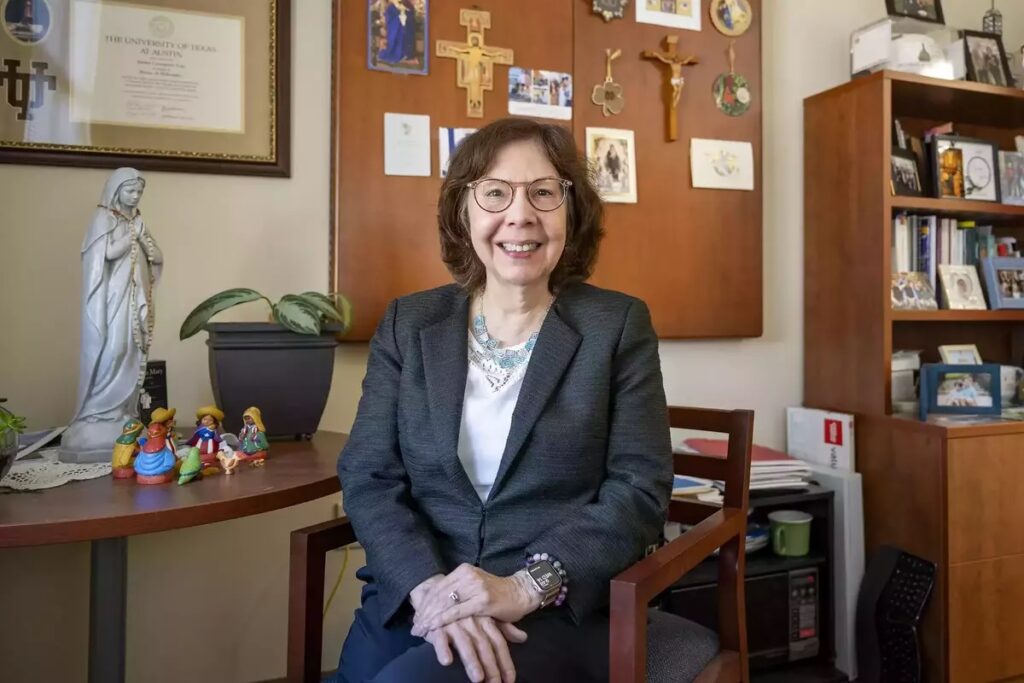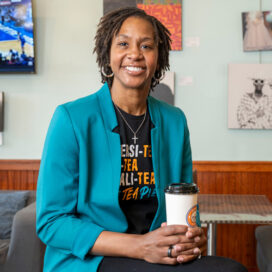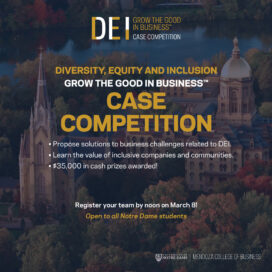2024 Women Lead: Sandra Vera-Muñoz
Published: March 15, 2024 / Author: Brendan O’Shaughnessy

Sandra Vera-Muñoz (photo by Barbara Johnston/University of Notre Dame)
Sandra Vera-Muñoz can point to the exact moment her research and teaching pivoted to focus on how accounting can incentivize sustainable business practices.
Always interested in how accounting affects managerial decision-making, Vera-Muñoz had an epiphany while listening to a speaker at a 2009 accounting conference in New York City. The message was that accountants are best positioned to measure and account for the risks and rewards related to a company’s sustainability practices, something that investors are clamoring for businesses to disclose.
“I came back to Indiana, and my wheels started to turn in my head,” she said. “Of course, there’s a perfect managerial angle to it, because it is also about incentives. How do you incentivize managers to pay attention to and even measure non-financial sustainability metrics, let alone improve them? It opened up a whole new world to me.”
Companies have always tried to measure risk. The idea that climate change is also a risk that must be accounted for came home to Vera-Muñoz when she returned to Puerto Rico in 2017 to help her mother. The same major pharmaceutical plants she had audited for a big accounting firm in the 1980s were shut down for months after Hurricane Maria devastated the island.
Vera-Muñoz now focuses on environmental, social, and governance questions in her accounting research and teaching. An associate professor in the Mendoza College of Business who first came to Notre Dame in 1994, she tells her students that their future employers expect them to know the standard accounting rules, but they are really hiring them for their judgment.
“Once you connect the dots in accountancy, then you realize this is really fascinating,” she said. “People tend to think that accounting is just debits and credits, and the stereotype is that people are in a cubicle, heads down and doing numbers.
“That could not be further from the truth. The way you do accounting affects decision making, affects behavior. You start thinking about how we measure things and how sometimes there’s a gap between regulations and how rules are applied. What’s most important is professional judgment.”
Vera-Muñoz grew up in Puerto Rico, the youngest of three children. Her father was an insurance sales agent and her mother was a pharmacist in her native El Salvador who became a social worker in Puerto Rico. Vera-Muñoz said she gets her outgoing side from her father and her faith and resilience from her mother. It was a family in which going to college was the only option.
“I actually liked science,” she said. “I thought I was going to study biology, but I figured out when I was a teenager that I’m very afraid of blood.”
She didn’t even like her first class in financial accounting at the University of Puerto Rico, but as a business major, she had to take two—and she became hooked by the managerial side.
“That’s where we started talking about compensation, and how you incentivize people to align the employee’s goals with the goals of the company, and information asymmetry and agency,” she said.
In her senior year, she met her future husband, Rafael, and they both landed jobs at Arthur Andersen, then one of the big eight accounting firms. Two years later, they left the firm to get MBA degrees at Penn State University through a scholarship that required returning to Puerto Rico. She got her first taste of teaching there and realized she wanted to enter academia.
Her doctoral program was at the University of Texas in Austin. With a minor in cognitive psychology, she designed a dissertation paper around the idea that students drilled in accounting assets and liabilities would have a harder time identifying opportunity costs than those without the specialized training.
It was a risky hypothesis because “it was a slap on the face” to the way professors taught accounting. But her adviser, Bill Kinney, believed in her, and when it proved correct, her first job asked her to design a course around it: Decision Processes in Accounting.
Notre Dame was the only northern school where she interviewed. And despite snow on the ground on April 1, Vera-Muñoz fell in love with the school from the first visit.
“There was something about it that is intangible, but it’s just there,” she said. “The mission and vision of this university, it’s everywhere, and it matched perfectly with my own value system.”
Thirty years later, she still finds the decision-making processes in accounting fascinating, especially now that much of her research focuses on sustainability. One of her most influential papers found that companies were better off voluntarily disclosing their greenhouse gas emissions because if there’s uncertainty, investors will lower the firm’s value.
Another interesting phenomenon she noted was a new trend called “greenhushing.” In response to anti-woke attacks on environmental, social, and governance policies, some companies have continued their efforts to become carbon-neutral, but they are no longer publicizing it. She asks her students to debate these thorny questions in class.
“We’re part of a big thing, and we’re just one small part of it,” she said. “It’s academia, it’s the lawyers, it’s the NGOs, it’s the shareholders, and the socially responsible investors. It’s our students, who really get it. That’s why when I go into the classroom, it’s such a pleasure, because we can have these conversations.
“I tell them it’s important to be informed on both sides of the issue, because you’re going to be advising these companies, your employers, about how to address these ever-increasing issues.”




